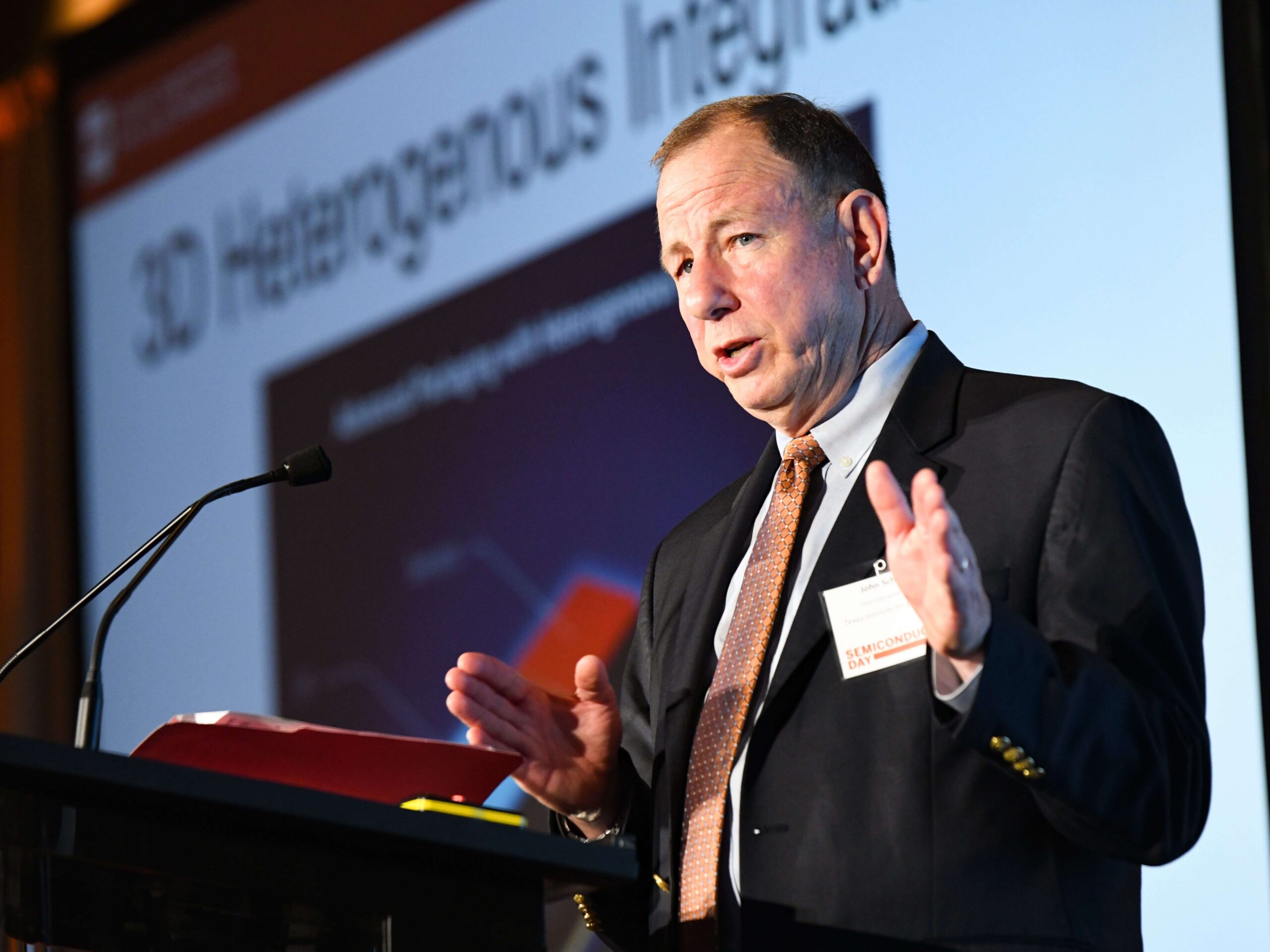Texas Institute for Electronics and Infleqtion Launch Quantum Manufacturing Center of Excellence

John Schreck, CEO of the Texas Institute for Electronics speaks at UT’s Semiconductor Day event.
The University of Texas at Austin and Infleqtion, a global quantum technologies company, have signed a memorandum of understanding to develop a new center of excellence for quantum manufacturing. With the recent opening of its flagship corporate office in Austin, Infleqtion will work with UT’s Texas Institute for Electronics (TIE), collaborate with the University’s faculty experts in photonics and quantum technologies, and draw upon its world-class facilities to scale domestic manufacturing capacity for quantum-enabled products in areas such as energy, navigation, defense, and health care.
“Quantum technologies will be increasingly important to both improving our lives and solving many of the societal challenges we face,” said President Jay Hartzell. “Infleqtion’s work in quantum physics complements the world-class expertise in many of our University’s disciplines, including semiconductors, AI, robotics, and medicine. These areas are also at the forefront of discovery and commercialization, and our work with Infleqtion will help advance our goals while also providing a great example of the ways we are working more closely with partners in key industries. I am excited for the potential impact this relationship will have in further cementing Austin and the state of Texas as leaders in quantum manufacturing, and ultimately, in helping us change the world.”
UT has more than 20 faculty members across various colleges, schools and departments working in quantum materials and algorithms. These researchers launched the twisted 2D materials field, an emerging area for quantum research that could lead to an energy revolution.
The envisioned center of excellence, qNexus, will scale the production of quantum-enabled devices to meet the growing demand of government and commercial markets. Together, TIE and Infleqtion will prioritize growing tomorrow’s workforce and training and equipping professionals to meet the demands of quantum and photonic manufacturing. qNexus will initially support scaling production for a high-precision atomic clock, an ultra-wideband quantum RF receiver, and core quantum components produced at scale nowhere else in the world, with potential for additional products such as inertial sensors, magnetometers, and bioimaging devices.
In the Cockrell School of Engineering’s Chandra Family Department of Electrical and Computer Engineering, one of the research focal points is Electronics, Photonics and Quantum Systems. Within the department, there are several research groups dedicated to quantum technologies.
The Center for Dynamics and Control of Materials at UT Austin recently received a fresh infusion of cash from the National Science Foundation that will open the doors for new research thrusts, one of which is the advancement of these twisted materials, also known as moiré materials. This research is led by Emanuel Tutuc of the Cockrell School’s Chandra Family Department of Electrical and Computer Engineering and Xiaoqin (Elaine) Li of the College of Natural Sciences’ Department of Physics.These types of materials, graphene being one of the more famous examples, can be integrated with traditional semiconductors and tuned to create capabilities such as superconductivity and magnetic properties for quantum information processing.
Researchers in the Cockrell School’s Department of Aerospace Engineering and Engineering Mechanics are leading a large, multi-university team using quantum sensing technology in outer space to better monitor climate conditions.
Quantum-enabled products have wide-ranging applications for a multitude of critical sectors. For national defense, they enhance resilient positioning, navigation, and timing (PNT), improving communications and sensing. Quantum sensors provide highly accurate data, driving efficiency and economic growth in sectors such as cloud computing, artificial intelligence, finance, telecommunications, oil, gas, and mining. Quantum sensing is already impactful across various industries, including the medical industry. For example, MRIs in medical examinations use quantum sensing.
“Infleqtion is exactly the type of startup that Texas Institute for Electronics wants to partner with,” said John Schreck, chief executive officer for TIE. “With our heritage in developing manufacturing technology and our strategy to lead in advanced packaging of semiconductors, TIE, UT’s resources, and Infleqtion’s innovations will form a team that brings the future of quantum technologies into near-term, real-world applications leveraging quantum sensing.”
“qNexus will enable us to build upon the robust investments in next-generation semiconductor manufacturing technology made by UT and private companies in the region. Infleqtion is well positioned to address the distinctive scaling challenges the U.S. faces in its pursuit to lead the quantum technology economy. By leveraging UT’s exceptional capabilities, Infleqtion can accelerate the time to market for essential quantum technologies, including precision clocks and RF sensors crucial for defense and enterprise applications,” said Scott Faris, CEO of Infleqtion.
TIE is a public-private partnership of preeminent semiconductor systems and defense electronics companies, national labs and academic institutions sponsored by UT. The consortium is dedicated to developing semiconductor innovations through advanced packaging and building a semiconductor ecosystem uniting industry, academia, and government. TIE recently received $440 million in funding from the Texas Legislature, complementing a $112 million appropriation to the University in 2021, paving the way for pursuing local, state and federal funding opportunities related to the federal CHIPS Research and Development and Manufacturing Incentives programs.
Infleqtion delivers high-value quantum information and software-configured, quantum-enabled products that deliver unmatched levels of precision and power, generating streams of high-value information for commercial organizations, the United States, and allied governments. With 16 years of ColdQuanta’s pioneering quantum research as the company’s foundation, its hardware products and AI-powered solutions address critical market needs in PNT, global communication security and efficiency, resilient energy distribution, and accelerated quantum computing. With offices in Austin; Boulder, Colorado; Chicago; Madison, Wisconsin; Melbourne, Australia; and Oxford, U.K., Infleqtion is revolutionizing how people communicate, navigate, and discover.
